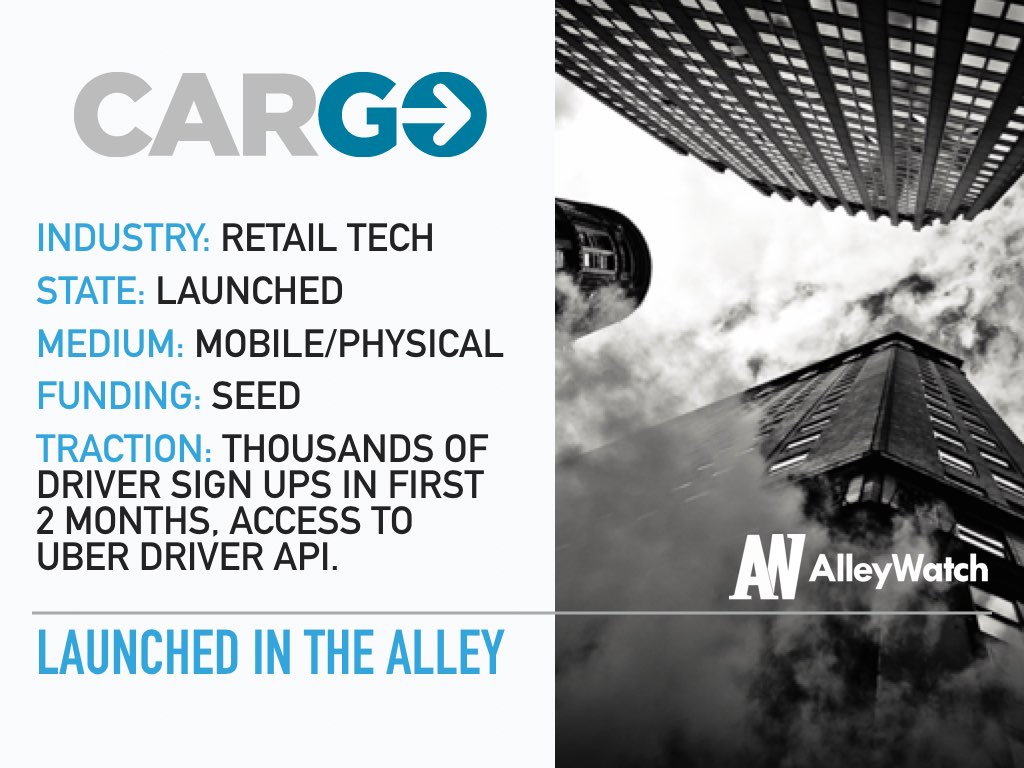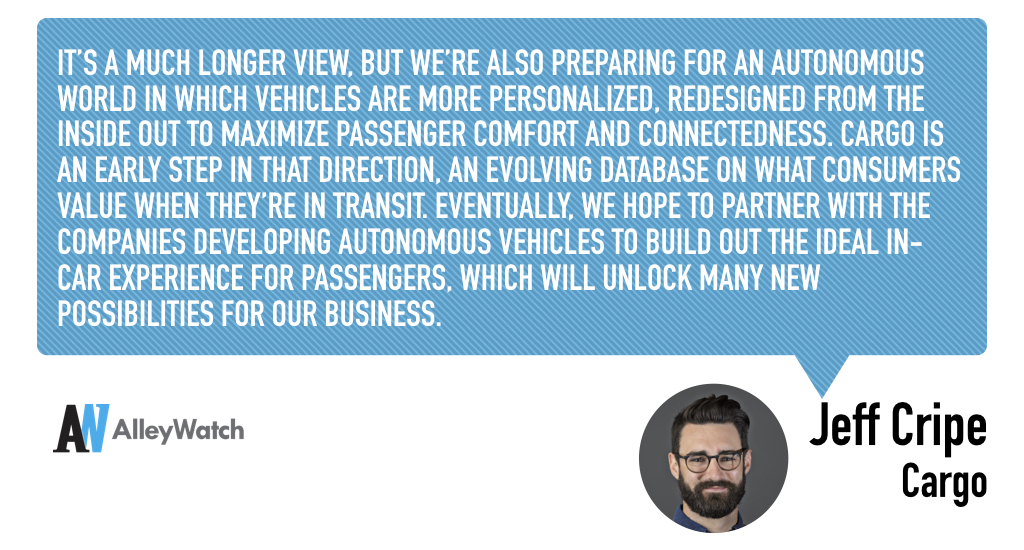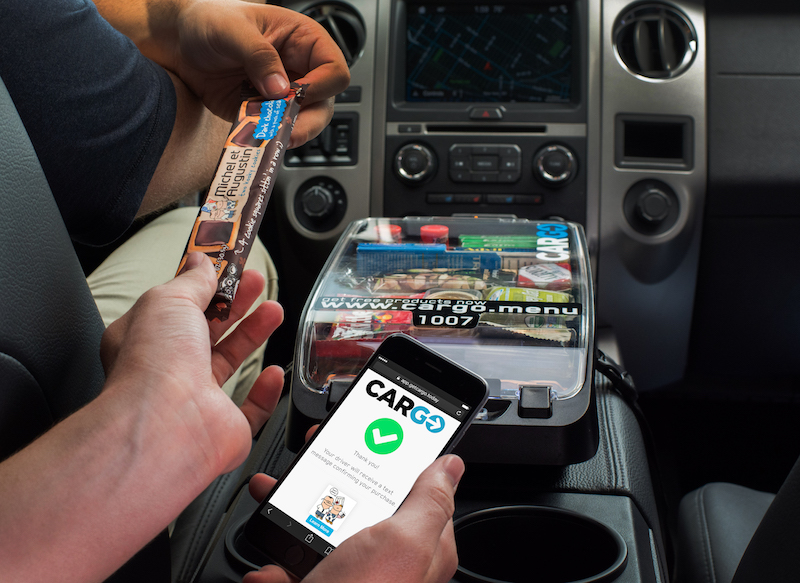Ridesharing apps have quelled the needs for your own car and while we enjoy the service and convenience, ridesharing still doesn’t provide us the feeling of being in your own vehicle. While your personal car may be stacked with snacks and all the amenities you need, your Uber isn’t…until now. Cargo, the in car marketplace, provides in-car foods and goods on the go to and is targeted towards drivers wanting to provide their passengers with the best experience. With nearly 15 million rides provided daily, and rising fast, there is a strong move towards making the ridesharing experience better, and Cargo is at the front of this push. In addition to serving customers, the drivers benefit from the extra cash, while being able to connect with customers on a higher level. Truly a win-win.
AlleyWatch chatted with cofounder and CEO Jeff Cripe about the company and the ridesharing industry at large.
Tell us about the product or service.
Cargo is an in-car marketplace that enables rideshare drivers to earn an extra $100-300 per month by providing passengers with essential goods, on-the-go. Passengers view product in Cargo’s custom display and purchase them on their phone via Cargo’s mobile website (no app required). There is no cost to the driver, we ship him or her a pre-packed Cargo box, track all orders in real-time, ship replenishment products directly to drivers’ homes, and deposit earnings directly into their bank account. For drivers, it’s a no brainer – a free and easy way to earn more while improving your ratings. For passengers, it’s the ultimate convenience – necessities find you in your moment of need, whether you’re hungry, hungover, running out of battery, or preparing to party all night.
How is it different?
Cargo isn’t different, it’s first. A category-of-one business. Several experts have written about how autonomous vehicles might reshape the retail industry, and the logistics frameworks that underpin it:
Benedict Evans (Partner, Andreesen Horowitz) wrote about how convenience retail will change as autonomous vehicles hit the road; Cyrus Radfar (Founder, TechCrunch contributor) wrote about how autonomous vehicles could be retail’s savior; Derek Thompson (The Atlantic) predicted that autonomous vehicles will become roaming storefronts owned by retailers and logistics providers looking to improve their bottom line while providing an even more on-demand customer experience.
We agree, but we aren’t waiting for autonomous, we’re reshaping how consumers and products connect today, through rideshare.
From a software perspective, we have the only inventory and order management system that can simultaneously track, reconcile, and replenish inventory across thousands of independent mobile storefronts. From a hardware perspective, the Cargo box is patent-pending, custom-made to fit into 90% of rideshare vehicles from a Prius to a Suburban, and designed with input from rideshare and OEM executives. It’s not only an elegant solution to in-car retail, it’s a hyper-functional, durable, and protected one.
What market are you attacking and how big is it?
We’re laser focused on rideshare. 15M rideshare trips happen every day. By 2030 there will be nearly 100 million rides per day. Cargo is creating a massive, mobile, and global marketplace that offers real-time fulfillment.
What is the business model?
Cargo’s model is based on our “Freetail” concept: a blend of free and retail products intended to create excitement and curiosity for passengers every time they hop into a vehicle. Cargo distributes free products on behalf of its brand partners like Mars/Wrigley and Kellogg’s, who pay Cargo a distribution fee to reach our consumers. For retail products, we function like a traditional retail, taking a margin on all sold goods.
What inspired the business?
We’re rideshare fanatics. I’m a California kid who ditched his car and never looked back. As the rideshare industry exploded, competition between the providers put downward pressure on fares, and therefore driver income. We founded Cargo to help drivers earn more money while providing incremental benefit to passengers like ourselves. Drivers supplying mints and water to passengers and Uber partnering one-off with Hershey and Pringles to distribute products to passengers, signaled that our thesis was correct: every rideshare vehicle has the necessary supply and demand conditions for a marketplace.
Why do you think servicing the rideshare drivers with this sort of offering will be a viable business?
Great businesses are solutions to great needs. Rideshare is forecasted to be a $285B industry by 2030, but that cannot happen if drivers continue to churn at an unprecedented pace due to declining income. Cargo is one turnkey solution for drivers to begin earning more. My prediction? Cargo is the first of many value added services that rideshare providers will selectively support.
It’s a much longer view, but we’re also preparing for an autonomous world in which vehicles are more personalized, redesigned from the inside out to maximize passenger comfort and connectedness. Cargo is an early step in that direction, an evolving database on what consumers value when they’re in transit. Eventually, we hope to partner with the companies developing autonomous vehicles to build out the ideal in-car experience for passengers, which will unlock many new possibilities for our business.
What are the milestones that you plan to achieve within six months?
We’re very focused on scaling New York City and Boston, launching in new markets, and our next round of financing.
What is the one piece of startup advice that you never got?
Create an Advisory Board of experts on your business, compensate them well and expect a lot out of them, and make sure to have at least one Advisor who represents your customers.
If you could be put in touch with anyone in the New York community who would it be and why?
Bradley Tusk. It was remarkable what he and the team at Uber accomplished from a regulatory perspective in the most iconic, hyper-regulated, and incumbent-advantaged taxi market in the world. Would love to hear some of his war stories, not to mention secure an allocation from Tusk Ventures.
Why did you launch in New York?
New York City is the mecca of rideshare. With more than 46,000 rideshare drivers, it’s an ideal launch pad for Cargo from which to expand. It’s also an incredibly fertile market to expand within. Because many of New York’s drivers have worked together at taxi or limousine services, Cargo’s driver2driver referral program spreads quickly through tightly knit driver communities. Our top drivers average 30-50 referrals each. One tech-savvy driver even bought and promotes the domain “StartCargo.today,” which redirects to Cargo’s website (GetCargo.Today) with his referral code. Especially in New York City, drivers are entrepreneurs. Cargo is a business within their business that helps reduce their fixed and variable costs, like insurance and gas.
What’s your favorite rooftop bar in NYC to unwind?
Has to be JIMMY at The James Hotel. Bar is always a bit crowded but the pool, the view, the sunsets are spectacular.






